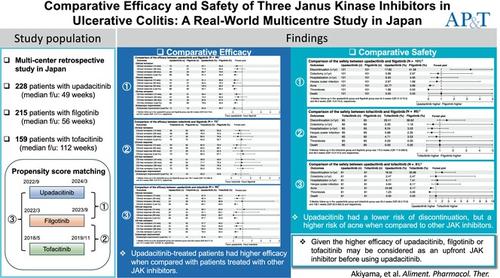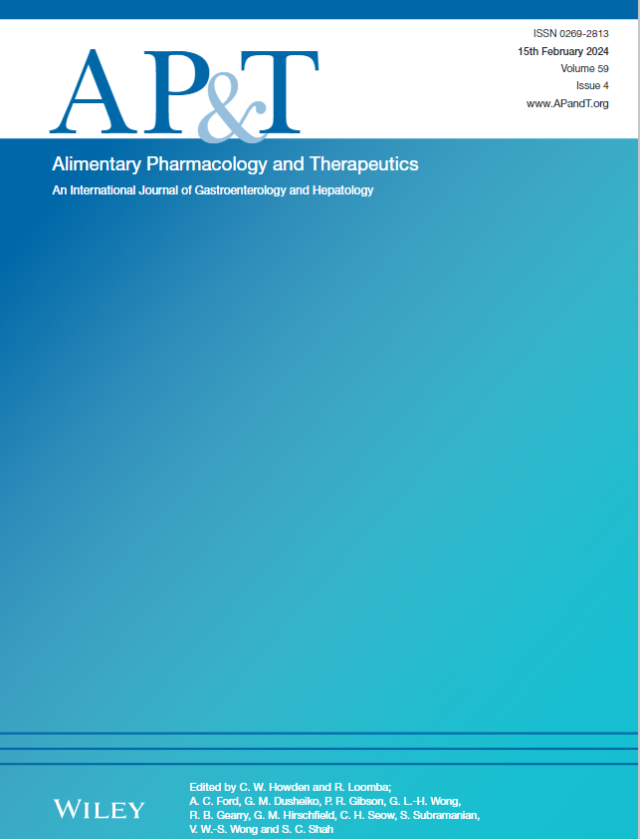三种 Janus 激酶抑制剂对溃疡性结肠炎的疗效和安全性比较:日本真实世界多中心研究
IF 6.6
1区 医学
Q1 GASTROENTEROLOGY & HEPATOLOGY
引用次数: 0
摘要
背景日本批准了三种Janus激酶(JAK)抑制剂用于治疗溃疡性结肠炎(UC)。目的比较这三种JAK抑制剂对UC的实际疗效和安全性。主要结果是10周、26周和58周以及最近一次随访时的临床缓解情况。为了比较JAK抑制剂的疗效和安全性,我们采用倾向评分匹配法建立了三个匹配队列(达帕替尼与非戈替尼对比、托法替尼与非戈替尼对比、达帕替尼与托法替尼对比)。结果 我们确定了228例达帕替尼治疗患者(中位随访49周;IQR 25-72)、215例非格替尼治疗患者(随访56周;IQR 17-82)和159例托法替尼治疗患者(随访112周;IQR 10-258)。在最近一次随访中,达帕替尼、非格替尼和托法替尼的临床缓解率分别为72.8%、50.6%和45.8%。在之前接受过其他生物制剂或JAK抑制剂治疗的患者中,超过70%的患者在使用达帕替尼后获得了临床缓解。多变量分析显示,既往接受过晚期治疗的人数与菲戈替尼和托法替尼的疗效成反比。对比分析显示,与接受其他JAK抑制剂治疗的患者相比,接受达帕替尼治疗的患者疗效更高,停药风险更低。结论考虑到乌达帕替尼的疗效特别高,即使在难治性UC患者中也是如此,因此在使用乌达帕替尼之前,可以考虑将非加替尼或托法替尼作为前期JAK抑制剂。本文章由计算机程序翻译,如有差异,请以英文原文为准。

Comparative Efficacy and Safety of Three Janus Kinase Inhibitors in Ulcerative Colitis: A Real‐World Multicentre Study in Japan
BackgroundThree Janus kinase (JAK) inhibitors are approved for ulcerative colitis (UC) in Japan.AimTo compare the real‐world efficacy and safety of these three JAK inhibitors in UC.MethodsThis was a multicentre, retrospective study of patients with UC started on JAK inhibitors. The primary outcome was clinical remission at 10, 26 and 58 weeks, and at the most recent follow‐up. To compare the efficacy and safety among the JAK inhibitors, we created three matched cohorts (upadacitinib vs. filgotinib, tofacitinib vs. filgotinib and upadacitinib vs. tofacitinib) using propensity score matching.ResultsWe identified 228 upadacitinib‐treated patients (median follow‐up 49 weeks; IQR 25–72), 215 filgotinib‐treated patients (follow‐up 56 weeks; IQR 17–82) and 159 tofacitinib‐treated patients (follow‐up 112 weeks; IQR 10–258). Clinical remission rates for upadacitinib, filgotinib and tofacitinib at the most recent follow‐up were 72.8%, 50.6% and 45.8%, respectively. Over 70% of the patients previously treated with other biologics or JAK inhibitors achieved clinical remission with upadacitinib. On multivariate analysis, the number of previous advanced therapies was inversely associated with the efficacy of filgotinib and tofacitinib. Comparative analysis showed that upadacitinib‐treated patients had higher efficacy and lower risk of discontinuation than patients treated with other JAK inhibitors. However, upadacitinib had a significant risk of acne.ConclusionsConsidering the particularly high efficacy of upadacitinib, even in patients with refractory UC, filgotinib or tofacitinib may be considered as an upfront JAK inhibitor before using upadacitinib.
求助全文
通过发布文献求助,成功后即可免费获取论文全文。
去求助
来源期刊
CiteScore
15.60
自引率
7.90%
发文量
527
审稿时长
3-6 weeks
期刊介绍:
Alimentary Pharmacology & Therapeutics is a global pharmacology journal focused on the impact of drugs on the human gastrointestinal and hepato-biliary systems. It covers a diverse range of topics, often with immediate clinical relevance to its readership.

 求助内容:
求助内容: 应助结果提醒方式:
应助结果提醒方式:


